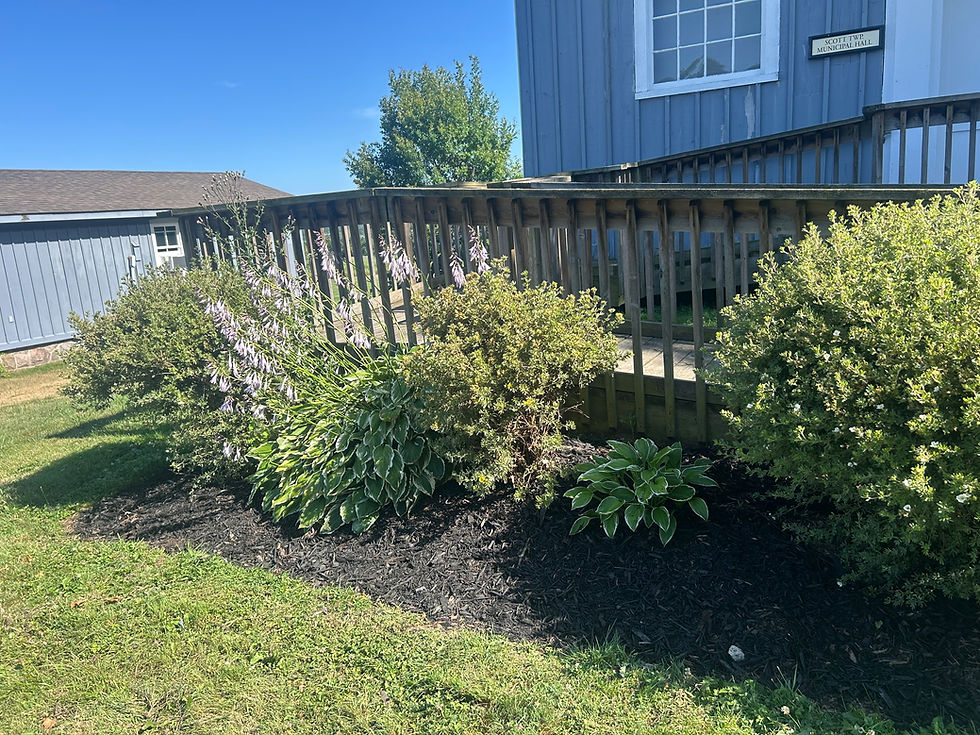Mulch Matters: Protecting Plants, Conserving Resources
- Brooklyn Webb
- Sep 7, 2025
- 2 min read
When you stroll through our museum garden, you may notice the earthy layer covering many of the garden beds; that’s mulch! While it may look simple, it plays an instrumental role in keeping our plants healthy! It conserves resources and even protects the wider environment. For centuries, gardeners and farmers alike have used natural mulches to enrich soil and support plant growth. Today, this tradition continues, blending practical benefits with ecological responsibility.

Regulating Soil Moisture
One of mulch’s greatest abilities is to act as a natural shield. By covering the soil, mulch reduces exposure to the drying effects of wind and sun. This prevents water from evaporating too quickly, meaning plants stay hydrated longer and gardeners spend less time watering. In a time when water conservation is more important than ever, mulch not only keeps plants thriving but also helps keep the water bill down.
Moderating Soil Temperature
Bare soil is vulnerable to extreme temperature swings, which can stress plant roots. A blanket of mulch keeps the soil consistently cooler during our summer heatwaves and delays root freezing in our cold winters. By protecting underground, mulch encourages stronger root systems, reducing the need for synthetic fertilizers! This supports healthier, more resilient plants.
Disease Prevention
Did you know mulch can also act as a barrier against disease? When rain falls directly onto bare soil, it can splash soil particles onto plant leaves, spreading harmful fungi and bacteria. A layer of mulch reduces that splash effect, lowering the risk of disease and decreasing the reliance on pesticides. It’s a simple, natural way to keep the garden healthy.

Suppressing Weeds
Weeds compete with our plants for water, nutrients, and light. A 7–10 cm layer of mulch blocks sunlight from reaching the soil, preventing most weeds from sprouting. This reduces or even eliminates the need for herbicides! It benefits both the environment and your back! Fewer weeds mean less time pulling and more time enjoying the garden’s beauty.
Supporting Beneficial Insects
Mulch isn’t just for plants; it also creates a safe habitat for many predatory insects that help control pests. By welcoming these natural allies into the garden, we reduce the need for chemical treatments and support a more balanced ecosystem.
Adding Nutrients to the Soil
As mulch slowly decomposes, it acts as a long-lasting fertilizer. Organic matter is released into the soil, improving structure, fertility, and microbial activity. Over time, this enriches the garden’s foundation, creating healthier conditions for plants to flourish.
A Note of Caution
As with all good things, balance matters. Over-mulching can suffocate plants by blocking water and oxygen from reaching the roots. Avoid creating “mulch volcanoes” around tree trunks. Instead, spread mulch in a flat, even layer following the package guidelines for best results.
Mulch: A Timeless Garden Ally
From conserving water to protecting roots and nourishing the soil, mulch is one of the gardener’s most effective tools. In our museum gardens, it helps us care for plants sustainably, reduce chemical inputs, and create a thriving ecosystem! The next time you see a mulched bed, take a closer look, and you can discover a world of benefits that has supported gardeners for generations.









Comments